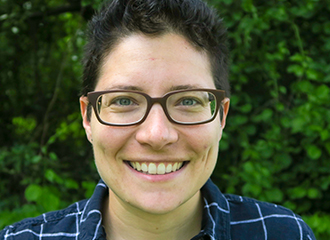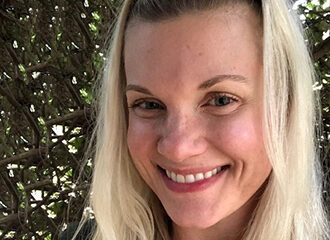
When I first entered treatment at The Renfrew Center of Philadelphia in 2015, I started developing self-compassion, self-acceptance, and self-efficacy for the first time.
Through multiple admissions to the Philadelphia and Boston sites, both teams helped me look deeper at the constellation of experiences that led to the development and persistence of my eating disorder.
Instead of feeling like something was inherently wrong with me, my team helped me break down my eating disorder into its many fragments, opening up space within me to be vulnerable. I began to understand that I was separate from this illness. It was difficult for me to believe not only that my eating disorder existed, but also that my eating disorder was, objectively, a ferocious bully. It was easy to feel protective of the eating disorder because of everything it helped me endure. It took time to realize that my eating disorder was not going to save me.
With the unending support of my team, I also began to feel safe exploring my gender identity, something that was inextricably tied to my eating disorder. I learned that my seemingly simple desire to be thin was actually more about eliminating traditional “female” parts of myself to appear more androgynous and align better with my nonbinary gender identity. The interplay of eating disorders, gender identity, and trauma is challenging and complex and took years to begin untangling the messiness. I learned though that I can nourish myself and continue exploring my gender identity at the same time despite the discomfort that comes up.
Working with a team I grew to immensely trust enabled me to believe what I already knew deep down: anorexia is a profoundly debilitating and painful illness with complex layers. Eating disorder treatment for the LGBTQIA+ communities needs to address compounding experiences, unique stressors, and the nuance of experiences with sensitivity, acceptance, and knowledge. Though not always easy, I believe that feeling affirmed and empowered in treatment and my life has helped me get to where I am today.
Today, I feel like I am standing pretty solidly on two feet for the first time in almost a decade. I carry the faith and knowledge that it is possible to recover fully and unequivocally, but that you cannot do it alone. I focus daily on intentionality and whether my thoughts and actions are fueled by the eating disorder or self-affirmation and I try to always take that next right step.
-OJ B. • Alumni, The Renfrew Centers of Philadelphia and Boston
Jamie “OJ” Bushell lives in Boston, Massachusetts and attended The Renfrew Centers of Philadelphia and Boston. OJ is a mental health and eating disorder advocate and writer, and is the co-founder of the blog and social media platform thirdwheelED, which shares the story of recovery from a queer lens and dual perspective. OJ’s writing focuses on the intersectionality of eating disorders, trauma, sexuality, and gender identity/expression. OJ uses their experience of seeking treatment for their eating disorder as a queer person to help raise awareness of the need for culturally responsive recovery support services for queer communities.


